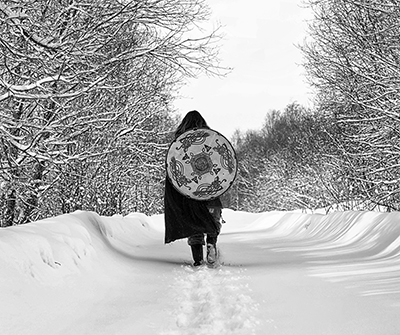
|
Warning! This posting is not going to be “happy thoughts.” So, if you’re at all depressed or suicidal, look away!
As I enter the eighth decade of my life, and after losing my wife of forty years just two years ago, I have come to a certain realization: the future, for me, is not what it used to be. This is not a good thought, but it’s also not something I can put away as idle rumination. It’s staring me in the face.
Ever since childhood, the direction of my life has been forward. I have anticipated, planned for, expected, and tried to divine the next step: next job, next project, next vacation, next holiday, next week, next day, next meal … next stage in my life.1 My head, my thinking, have all been about what’s coming. And yes, you can to some extent foretell the future, because you live in the prefrontal lobe of your brain where the planning and scheming parts reside. You can make plans for tonight, tomorrow, next week, and even next month and year, so long as you allow a marginal calculation for uncertainty, the unexpected, the occasional accident, and even tragedy.
I have lived so much forward, in the future, that memory, for me, is a hazy thing. I know generally what I was doing in 1988. I can remember details of past jobs, projects, and vacation trips, mostly as random flashbacks. But the exact sequencing and duration are a blur. And as for what I had for dinner last week, that’s a guess. The past has no special meaning to me, except as the foundation for what is to come.
But now … With seven-eighths or nine-tenths or whatever amount of my life left before me, the future is more and more foreclosed. All I’m supposed to have left is memory—and that’s still somewhat hazy, because my natural direction is still forward. But now that forward is into grayness and eventually darkness.
I knew from approximately my days at junior high school that I was not ever going to fulfill every little boy’s dream of becoming President. I knew from sometime in high school that I was never going to be a serious professional like a lawyer or doctor, with an upward career course and riches assured. I knew from that terrible night that the Selective Service introduced the draft lottery during my senior year in college that I would never be a soldier, unless I wanted to enlist.2
After an adolescence and early twenties with no serious romantic attachments or prospects, I began to suspect that I would live my life as a single man. And then I met Irene and the course of my life took a sudden turn. She introduced me to many things, including traveling for pleasure, going to the theater, Celtic music, cooking and entertaining as an art form, a broader political scope, and a new sense of family. She made me into a different person. But now I am single again, and my prospects for another life companion are dwindling to the point of extinction. That part of my life is just memories—disjointed ones at that.
Now, although my body is relatively healthy and strong, I am beginning to appreciate some of the things I once could do without a thought. Now I need to plan for them and allow time for recovery. For instance, a week or so ago I took a long motorcycle ride into the mountains: 375 miles from the Bay Area up to Lake Tahoe and back in one day. I used to make this trip with friends and think nothing of it the next day. Now I needed a day and a half of idleness, sitting in my chair, reading and dozing—plus a couple of aspirin for the strain in my right wrist—in order to recover my poise and balance. An airplane flight across country is wearing, and the twelve-hour flight to Europe is daunting because of the seats, the limited legroom, the cramping, and the dehydration.
So I am beginning to foreclose the idea of future travels to either Europe or Asia. And I suspect that long motorcycle rides—especially the cherished idea of a road trip of several days on the bike, off to see the Northwest or other parts of this great country—may no longer be possible.
I still have family and friends, and I see them about as often as ever. So far, I have been spared the cycle of deaths that afflicts older people. I believe that’s because we have all been leading healthier lives since our young age: vitamins, nutrition, exercise, the Surgeon General’s report, and a health consciousness that our parents never had. I still do my karate katas, although sometimes less frequently when I get busy or when my back hurts in the morning. I watch what I eat, but not as much as I should. My morning pills still comprise more supplements than actual medicines. But I know that all of this will slowly change as my eighth decade slides into my ninth.
I still have some new books in me, along with the mental energy and focus to write them. The two ME novels need a third book, I think, to go along with the third books that I have written for The Judge’s Daughter and its sequel, and for The Children of Possibility and its prequel.3 And after that I have a half-dozen other story ideas to develop. If I can produce a new book every year or so, these ideas will take me a long way through this decade. So that’s a future to hang my hopes on.
Growing up is a hard transition. You put your childhood dreams and ambitions at risk against the development of your actual skills, intelligence, endurance, energy level, and personal prospects. Going from youth to middle age is hard, too. You adjust to a new set of dreams and ambitions, with a certain amount of bitterness as you gain an understanding of how the world really works and regret for your own lost naïveté. And finally, growing old is hard. If you’re lucky, you may have achieved a stable place in life—financially, emotionally, spiritually, and politically—but now you take your store of knowledge and skills, your preserved wisdom, your surviving sense of wonder, and your failing expectations into the long twilight that precedes night.
But there is no sense in having regrets. And no sense, either, in fearing the inevitable slide and the dark pit that awaits you at the bottom. All you can do is buckle your belt, tighten your laces, check the loadout of your weapons, sharpen your wits …
And move forward as if everything is still the same. Because nothing has really changed.
1. Everything except next the next woman, the next romance. Irene sealed all that for me. We were an item.
2. With a lottery number of 347, I took a big sidestep away from my generation’s war: Vietnam.
3. I don’t call them “series,” because that presupposes a dedication to producing a whole string of books. Let’s call them “groupings.”



